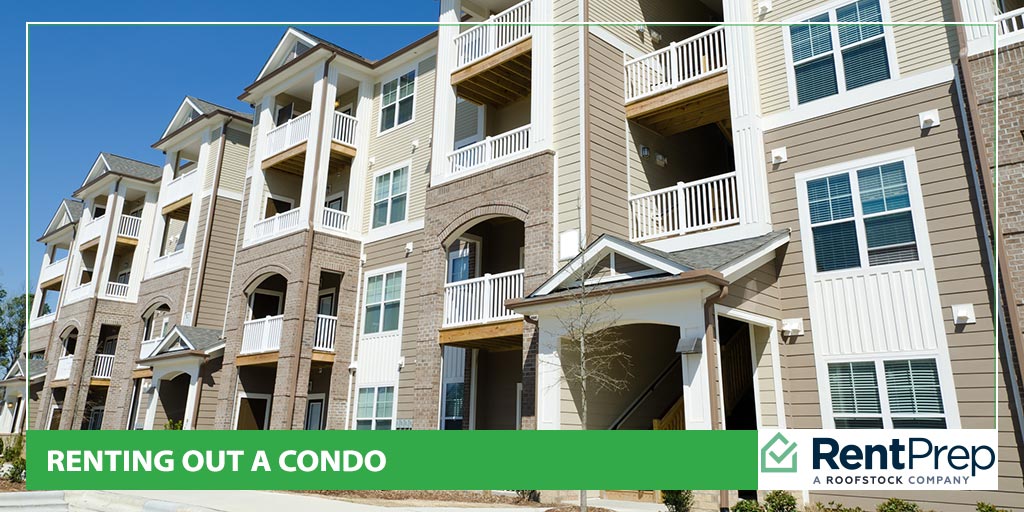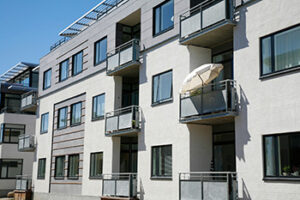
Renting out a condo can be a great way to earn some extra income but is a different process than renting an apartment.
We recently had a guest on our Podcast (RentPrep for Landlords) explain why he focuses on buying and renting condos vs. apartments.
You can listen to that podcast and then read the summary below as we describe the process for renting out a condo.
We will discuss the contents of this episode below.
A table of contents for renting out a condo:
You can click any of the items above to jump ahead to each section.
Let’s begin with the basics…
What is a condo?

A condo is short for “condominium” and is typically a residence owned by a family or individual in a community building. Condos are different from a standard apartment because they have shared common areas which include gyms, garages, spas, pools, yards and even shops depending on location. These amenities are maintained through dues paid by condo owners to an elected condo board. These fees are for the upkeep of common areas and not for repairs that happen inside of your condo such as a leaky faucet or broken fridge.
If you’re a fan of Seinfeld you’ve probably seem some of the drama play out with these condo boards. It can get pretty intense.
This may be a goofy video but it highlights an important point.
Condos are not the same as an apartment and their are unique rules for each condo.
Buying a condo and renting it out
First you will need to check if the condominium is in an association and what the rules are. The HOA rules can dictate if you’ll be able to rent or how profitable you can be. Every condo has it’s own set of rules so it’s important to read through the condo docs before buying a condominium.
Can you rent out a condo?
Phillip explained that you need to look over the condo docs because one condo can allow leasing where another won’t in the same complex.
Just because someone else rents out their condo doesn’t mean it will be a guarantee that you can do the same.
Also, be aware of any particular lease restrictions or renting restrictions.
“There are two basic types of lease restrictions. One type limits the total number of leased residences within a development (e.g. no more than 20 residences can be leased at one time). The other type requires all new owners to live in the residence for a specified time (e. g. one year) before the residence can be rented.” Source – ECHO
So if you’re planning to buy a condo and rent it you’ll want to look over any lease restrictions. This can also be tricky if you have a renter leave and someone else scoops up the last leased residence.
Why Are Mortgage Rates Higher on Condos?
Certain condos will be warrantable and others are non-warrantable. If it is non-warrantable you have to go through a non-warrantable lender and this means higher interest rates and higher down deposit (25% and up). Even if you can secure a traditional mortgage through Fannie Mae, the rate on a condo will usually run about one-eighth to one-quarter of a percent (0.125-0.250 percentage points) higher than what you’d pay on a single family home. Source — Mortgage Loan
Are HOA Fees Tax Deductible for Rental Property?
If the condo is a rental than you can deduct the HOA fees as a rental expense. If the condo is a personal residence you cannot deduct the HOA fees. [source: Intuit]
Be aware of the HOA fees (home owners association fees) . If your condo fees are $400 a month that is going to eat into your profits of renting out your condo. Granted, you will be on the hook for less maintenance but you’ll still need to set aside some funds for maintenance inside of the condo.
Condo Reserves
Be aware of the reserves the association has. If the community is Fanny Mae compliant it means that the reserves must be in excess of 10% of the operating budget.
Reserves are specifically for larger projects such as siding, roofing, paint common areas. When you pay into an HOA each month some of that fee will go into reserves while the rest is used for regular maintenance such as law care.
In some unique cases residents have been known to pay a special assessment [source: Nolo]. This happens when there is major damage or upkeep that exceeds the reserves of the condo.
In these situations the condo owners must pool resources outside of their HOA fees to pay for the project.
Screening tenants in a condo
We cover this process in depth in our tenant screening tutorial. There are a few things you should be aware of however.
Some condos will attract an older renter and there a few things to consider with this demographic.
Verifying income of an older renter

A rent to income ratio is an important aspect of screening your tenants. Many landlords look for a 2.5 – 3x multiplier of monthly income compared to rent.
For someone who is retired their rental expense is going to be a larger expense for them compared to someone who is younger.
Their rent is going to be a higher percentage of their monthly expenses because they don’t have student loans, mortgages, and expenses related to raising a young family.
You’ll want to verify their income by looking at 90 days of bank statements.
You’ll see “SSA Wire” on a bank statement that indicates their social security income. This is a verifiable source of income that should be considered when renting to a retired individual.
Adverting on MLS Listing?
In the podcast Phillip mentioned how he gets a lot of bad leads from Zillow and Craigslist because his condo is only 55 and older.
All the leads he gets typically tend to be under 55 and that is why he lists on MLS.
Tenant screening criteria
You want to have a tenant screening criteria for each of your rental properties.
We already mentioned earlier how your rent to income standard will most likely change.
We should also mention that your condo may have rules in place on the age of the renter if it is a senior housing community.
If your condo’s HOA rules indicate that this is a 55 and older community your renter needs to meet this age standard.
Senior housing communities are designated by HUD and must have one of the following:
- 80 percent of the units have at least one tenant that is older than 55
- All occupants are 62 or older
- HUD established the housing development as a senior housing community under a federal, state, or local government program.
Typically you can be accused of discrimination if you were to deny someone based on their age. This is not the case with senior housing communities.
Related Resources
Podcast #162 Managing 55+ Rentals
FAQs on Condos
What is the difference between a condo and a townhouse?
In a condo you own the actual structure of the building with other owners in the association. A townhouse refers to style of a building and has nothing to do with associations or management of the property. When someone lives in a condo it is assumed they have an association and rules that regulate the common areas. A townhouse can belong to an association but it is not assumed since it only refers to the style of construction (typically two stories with shared walls to other townhouses in the row).
Is a townhouse a condo?
A townhouse is typically not considered a condo because the common areas are not jointly owned. With condos the exterior of the building is owned by the association but with townhouses the exterior is owned by the resident.
Which is better a townhouse or a condo?
A condo is typically cheaper because it does not include the land. Which option is better will depend on your needs. A condo will be less maintenance but a higher monthly fee on any HOAs. A townhouse will typically give you more flexibility and ownership but will require more maintenance.
Do you have to pay property taxes on a condo?
Yes you do have to pay property taxes on a condo. Typically the tax will be less due to condos being smaller in nature but they amount you pay can vary by location. You may not own the land but you do own the property inside your walls and will be taxed on this.

